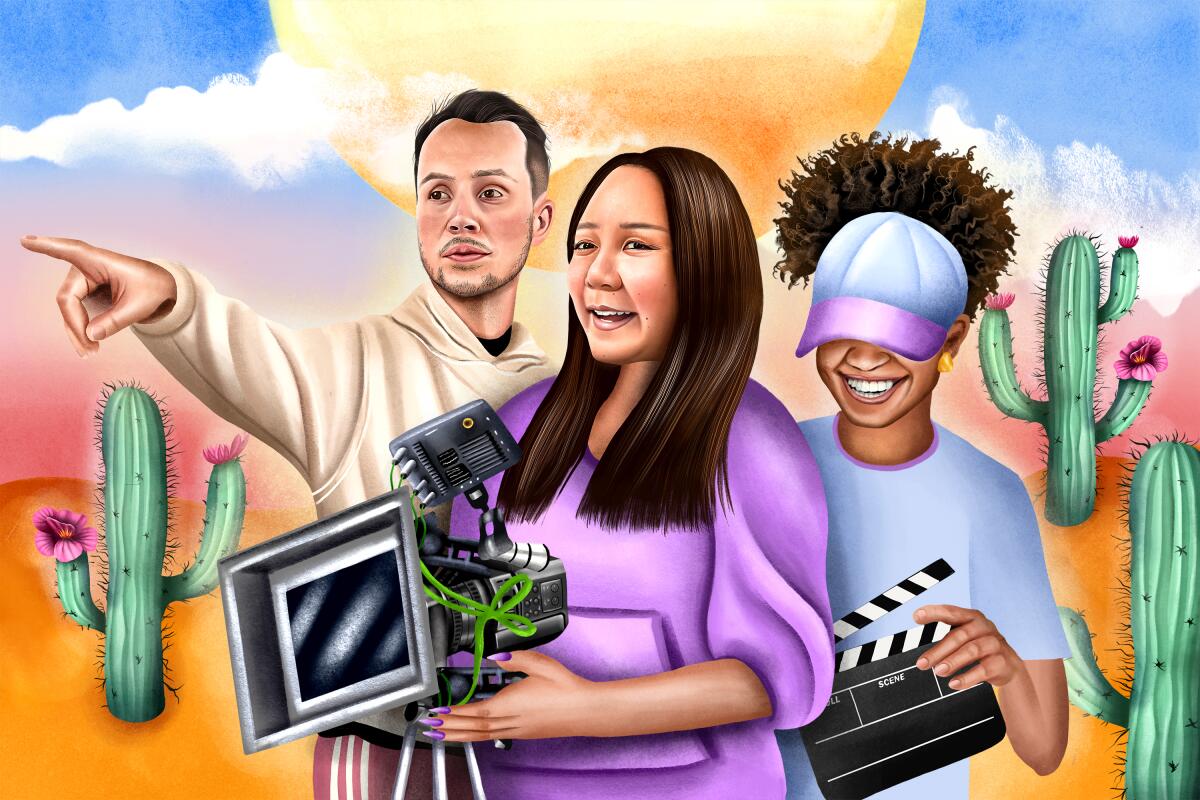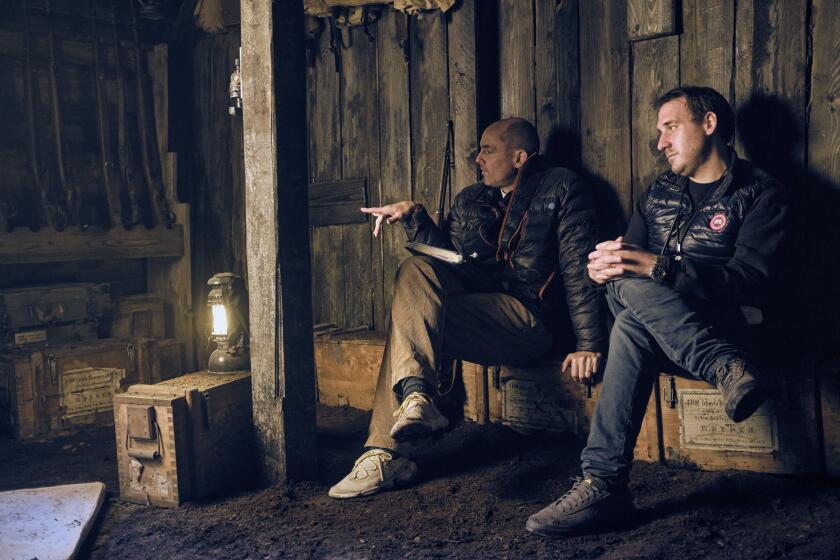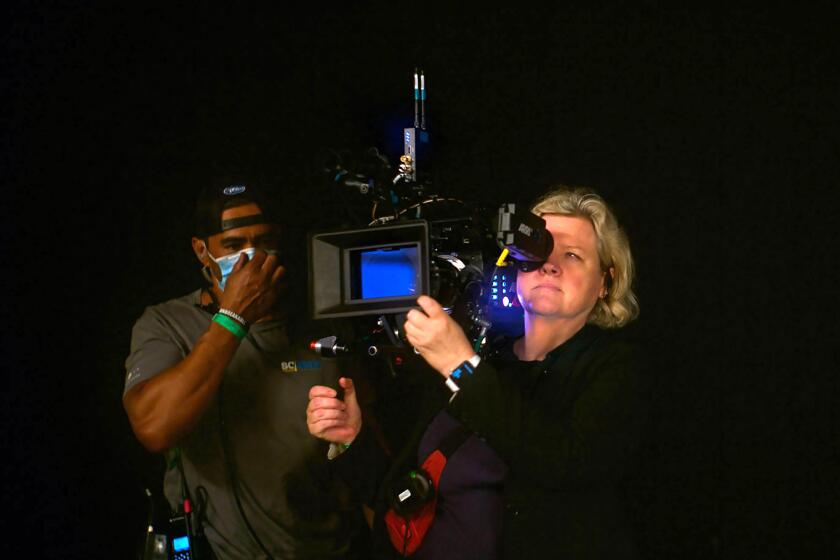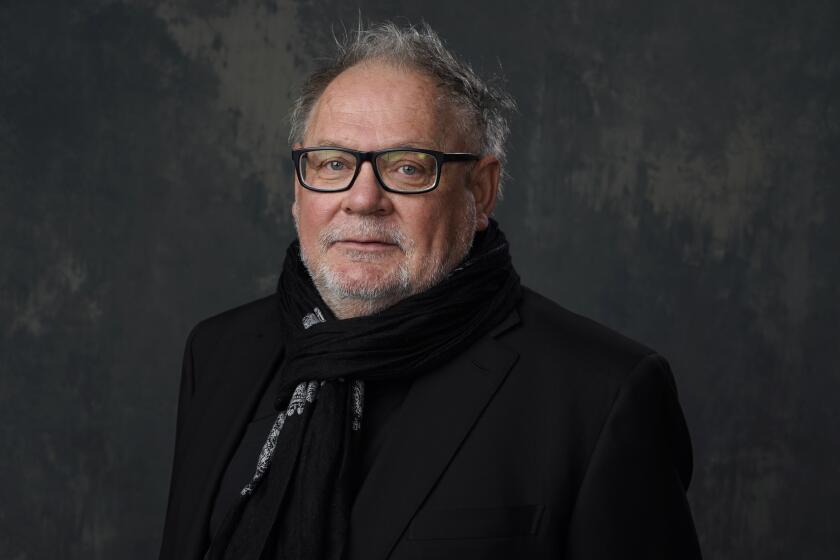Explaining Hollywood: How to get a job as a cinematographer for film and TV

- Share via
Sometimes when you’re watching a film or TV show, you can’t help notice what the camera is doing.
Take, for example, the movie “Birdman or (The Unexpected Virtue of Ignorance),” which is told through what appears to be one long take — as if the filmmakers hit the “record” button and, two hours later, had their movie. Members of the Academy of Motion Picture Arts and Sciences gave cinematographer Emmanuel Lubezki an Oscar for that work.
More often, though, the camera’s positioning, movement and focus are inobtrusive. And that’s by design. The point, cinematographer Shane Hurlbut said, is to have the camera work and lighting amplify the emotions the actors bring to the scene. “It’s like you’ve turned it up to 11,” he said.
For example, he pointed to the 2001 teen romance “Crazy/Beautiful.” To underline the actors’ portrayal of the characters falling in love, Hurlbut said, he chose shots that gradually narrowed the space between the two of them until, from the audience’s vantage point, there wasn’t any left.
No one watching the film is going to say, “Oh my God, you see he’s narrowing the gap,” Hurlbut said. “But you’re going to feel that. Being obsessed with those subtleties is what I think the art of cinematography is.”
To work as a cinematographer (or director of photography, as the position is also called), you’ll have to know a lot about cameras, lenses, lights and other technical aspects of the job. But the pros say the work isn’t about technology, it’s about storytelling. Specifically, it’s about helping the audience connect with the story as it’s envisioned by someone else — the director in the case of a film, the showrunner in the case of a TV series.
“You’re trying to find visuals that specify what the character’s feeling, and finding ways to visually interpret it to make the audience feel that way,” said director and cinematographer Michael Goi.
The Times spoke with current and former cinematographers Goi, Hurlbut, Stephen Lighthill, Shelly Johnson, Kira Kelly, Jasmine Karcey, Charlie Lieberman, Tommy Maddox-Upshaw, Erik Messerschmidt, Arlene Nelson and Checco Varese, as well as Chaim Kantor, interim national executive director of the International Cinematographers Guild, about what it takes to become a successful cinematographer. Here are their insights.
Who becomes a cinematographer?
“First and foremost,” Karcey said, “you have to want to be a storyteller. You have to be a storyteller.”
The cinematographer helps decide how scenes will be lit, where cameras will be placed, what they’ll focus on and how they’ll move. In essence, the cinematographer is the person in charge of the audience’s point of view — how it will see the story being told.
And it’s more than just choosing camera angles and shot composition. “With the director, you’re deciding which shots are going to be photographed,” said Messerschmidt, whose work on “Mank” won an Oscar in 2021. “You’re deciding which pieces of a scene are going to make their way to the editing suite.”
Naturally, a cinematographer needs to understand the technology and the techniques involved. “Even if you move the camera just a few inches or change a lens, it will change how the story will be portrayed,” Karcey said. Minor changes in color or camera placement can change the mood of a shot and convey something different about how a character feels.
But being a master of camera technology won’t, by itself, make you a good cinematographer, Maddox-Upshaw said. He pointed to Rick Rubin, an enormously successful music producer but “not the greatest musician in the world,” as an example of how artistic instincts trump technical mastery. “If you have a certain level of taste,” he said, “that’s what people are paying you for.”
Johnson said the creative and storytelling choices you make inform the technology side of a project, not the other way around.
James Friend recalls rolling around on the floor acting out battle sequences for the WWI film while planning shots.
Having common sense and the ability to think on your feet are key skills, Hurlbut said. That’s because a cinematographer will frequently be confronted with unexpected challenges on set.
“Mother Nature can be amazingly beautiful and vicious at the same time,” he said. “You have the best laid plans, and then it all becomes a [horror] show. You have to be able to think on your feet very quickly and come up with a plan that unites the team and also continues to fuel the director’s vision and move the needle forward.”
Goi offered this example from a nighttime shoot some years ago. The plan was to film a car in an alley using lights mounted on a hydraulic boom called a condor, but the hydraulics failed at the last minute. So Goi called for a 4-foot flourescent tube light to be placed behind the car, turning the car’s exhaust into a moody light source. “It was actually a much better idea than I originally had,” he said.
Lighthill, who is president of the American Society of Cinematographers and head of the American Film Institute Conservatory’s cinematography faculty, said a big part of the job is people skills — being able to lead a potentially large team of crew members while also collaborating with the director and other key personnel on set. Welcoming cinematography students to AFI, he said, he tells them on Day 1 that they’ll graduate with a master of fine arts in cinematography, “but you should be getting a degree in psychology.”
“We definitely have to be great communicators,” Kelly said.
Being well organized is helpful too, Nelson said. “Such a big part of it is just the ability to have so many balls in the air and know where they all are at the same time,” she said.
Film producers will tell you that there’s no typical day in the job -- and there’s no single path to becoming a producer. But there are traits you can develop and entertainment industry paths to follow that will set you up for a career in Hollywood.
How do you get started?
Although their stories are all different, the pros all said they got their foothold in the industry through a combination of work, luck and a willingness to take risks.
For example, Nelson was a production assistant when she landed an interview for a last-minute opening as a camera assistant — a job she’d never done, working with a camera she’d never used. So she spent a few hours at a rental house with the camera (“someone very kind there showed me how to load it”) and her copy of “The Professional Camerman’s Handbook.” She said she was honest with the producer about her inexperience, but she got the job anyway.
You don’t have to haunt a rental house to learn about the technology involved in the job. Thanks to the internet, there are abundant resources on Facebook, YouTube and other sites, including discussion groups for different types of gear and instructional videos from the makers of cameras, lenses and lights. Then there are subscription-based sites like Hurlbut’s Filmmakers Academy, which offers online classes in cinematography and other crew jobs. There’s also American Cinematographer magazine, whose articles offer technical instruction and how-I-did-it insights from shooters.
Nelson said the Cinegear Expo trade shows are also good places to learn about equipment, attend seminars, rub shoulders with industry professionals and potentially talk a company into lending you demo gear for your next project. “It’s like you’re a kid in a candy store,” she said.
Another starting point is film school or, at a considerably lower cost, community college — many of the ones in the Los Angeles area offer classes in various aspects of cinematography. Those studies will also jump-start your networking, connecting you with a group of peers who are all trying to get their start in the industry, Kelly said.
Halyna Hutchins, the cinematographer killed on set of an Alec Baldwin movie, was going to be ‘very famous,’ a director who worked with her said.
Like Nelson, most of the pros interviewed spent several years holding lower-level jobs on one of the three teams overseen by cinematographers: grips, who set up the equipment and move the cameras; electricians, who power and light a set; and camera operators and their support staff. Being on set, Maddox-Upshaw said, gives you the opportunity to ask questions, take notes and listen in on the discussions cinematographers have with other pros.
The difficulties on set can be just as instructive as the times when things are going well. “A film set is an incredible classroom if you’re willing to sit and listen and watch,” Messerschmidt said. “It’s also a melee of disinformation and confusion and frustration for those that struggle to see the forest through the trees.”
In his earlier days on set, he said, he would take notes on the relative positions of the actors and the cameras, look at what was shot and what was cut together, then think about how the filmmakers had arrived at that place. On the whole, he said, “the educational opportunities, if you’re observant, are profound. You just have to put in the time.”
The pros stressed how important it is to get to know others in the business. “Hold onto those relationships,” Maddox-Upshaw said, because you never know where people will end up. For example, he said he met Gigi Causey when she was a production supervisor on “Straight Outta Compton” and he was a second-unit director of photography. But soon she became a production executive at Fox, helping him land the cinematographer’s gig for the FX Network TV series “Snowfall” in 2019.
“It changed my career,” he said, giving credit to writer-director John Singleton as well.
Another good way to make connections, the pros said, is through online communities such as Women in Film and TV on Facebook and the International Collective of Female Cinematographers. The latter helps members improve their skills, pick one another’s brains and promote themselves. “It’s a really supportive group of women,” Nelson said.
And then there are internships. Kantor of Local 600 said the union partners with several studios that have internship programs, including Warner Bros. Discovery, AMC Networks and Sony Pictures, to place interns on productions, giving them training and work hours that could qualify them for union membership. IATSE instructors also work with Hollywood CPR on an affordable training program for camera loaders and digital utility workers, among other entry-level spots on set.
One other L.A. program noted by Kantor is ManifestWorks, which targets people who’ve been unhoused, incarcerated or in foster care. ManifestWorks trains enrollees to be production assistants for various departments, then connects them with job opportunities.
The camera team had to learn the songs and choreography that Austin Butler was to perform so they’d know where he was going -- and he’d know where they were.
What are the career paths?
Karcey said there’s a natural progression from the ranks of the camera and lighting departments to cinematographer. One key to advancing, she said, is to start shooting whatever you can and keep at it.
“What I say to myself is, as long as the [latest] passion project, the short film, is better than the previous short film, then I’m doing good,” she said.
The American Society of Cinematographers offers two kinds of help for shooters. For working cinematographers trying to advance their careers, its Master Class program presents five-day seminars taught by veteran cinematographers. These focus on both the technical and interpersonal skills demanded by the work, said Johnson, who chairs the society’s Master Class committee.
A better option for people just starting out is the society’s mentorship programs, which annually pair 80 to 90 shooters at varying stages of their career with experienced volunteer mentors. Lieberman, a co-chair of the Master Class committee, said the program has put a special emphasis on working with underrepresented people.
Goi, the other co-chair of the Master Class committee, said having a mentor is a good way to learn all the relationships among the people involved in a production. “Most everything that’s technical in our profession, in our business, you can honestly kind of learn in a book,” he said. “What a book and what film school can’t teach you is the politics of the business, how the industry runs from a political standpoint, who does exactly what on a set, how do projects get green-lit.”
So you want to direct, but you don’t have a wealthy benefactor or thousands of dollars to spare? It might be time to think about raising money from the throngs of movie lovers.
How do you make money? (And what kind of money?)
Expect to spend several years working in the industry before you can make it full-time as a cinematographer, the pros said.
“In the beginning you will probably take on [cinematographer] jobs where you’re not getting paid very much. Maybe you’re just getting paid in meals and lodging,” Nelson said. But she added, “You have to know when to stop that.” If you’re not making a living as a cinematographer after about five years, she said, it’s probably time to find a different specialty.
Lighthill said that most of the AFI students he’s taught are working full-time as cinematographers within five years. But for the first year or two, he said, “they may struggle a little” and have to fall back on work further down in the electrical or camera department. “The smart ones just keep shooting whatever they can shoot,” he said, which helps them meet people and build up their network.
How much you’ll earn depends on whether the project you’re working on is covered by a union contract. The International Cinematographers Guild, or International Alliance of Theatrical Stage Employees Local 600, represents everyone in a production’s camera department, from film loaders and their digital equivalents up to directors of photography. Their pay scales are tied to the production’s budget and distribution, but for films shot by Hollywood studios, the minimum pay for cinematographers is around $4,000 per week, plus contributions to pension and health benefits.
The vast majority of film and TV production is covered by union contracts, Kantor said, and those jobs are not generally available to non-union shooters without some special dispensation. Instead, the pros said, the main sources of non-union jobs are music videos, documentaries and extremely low-budget films.
To join Local 600 on the West Coast, you’ll first have to either do 30 days of work on union shoots within a year (which, again, is hard for nonmembers to do), or 100 days of union and non-union shoots within three years. Then you’ll need to be placed on a roster of professionals maintained by the major studios, Kantor said, after which you’ll be eligible for your union card.
Director of photography Russell Carpenter saw first-hand just how much technology has changed since ‘Titanic.’ Then he got down to work.
How is this career different than it was 10 or 25 years ago?
Pros say the job is the same at a fundamental level, it’s just that some of the tools are different. Digital cameras are lighter and easier to move in ways that seem to defy gravity — think of what you could do with a drone instead of a crane or a helicopter. Lighting has been revolutionized as well, with LEDs emerging as a less power-hungry and more adjustable alternative to the tungsten lights the industry relied on for decades.
Nevertheless, the latest changes in technology— such as the advent of high-resolution cameras in phones — have opened the door to many more filmmakers producing far more works. Varese put it this way: Before the piano, there may have been many potential Mozarts. But it wasn’t until the piano existed that a Mozart could actually emerge.
Among the potential new Mozarts are kids from around the world in countries rich or poor, he said, who only need access to a computer and a phone or a point-and-shoot camera. “You don’t need to go to Hollywood and get the camera and get the lenses and get the film.”
Maddox-Upshaw said technology is making it easier for young cinematographers to promote themselves too, with DIY streaming sites and social networks helping shooters show off their work.
Just as fundamentally, the pros said, cinematography is becoming less white and male.
“Right now it’s definitely different for me,” said Maddox-Upshaw, who was once “the only Black face in grip electric” in his union in Massachusetts. “But I do not forget the days of what I dealt with, just trying to get an interview” — and then being told his reel was “too dark,” as in, it had too many scenes with Black actors. He explained that a lot of filmmakers want to see something in your reel that looks like the story they’re about to shoot, “which is a weird thing, because a really good cinematographer can shoot any type of story. But a lot of filmmakers want to already see their movie sometimes in your reel.”
Kelly said she ran into the same problem. “I do feel like there is a real change,” she said, noting that when she reaches out to other women or Black DPs, “We are definitely working.” But the numbers? “They are horrible.”
That’s true in part because the people with the power to hire — producers, showrunners and directors — continue to be white men. The more diversity at the top, the more diversity there will be in the ranks, the pros said. Or as Kelly put it, “It’s the whole trickle-down thing.”
Over the 12 years she’s been in the business, Karcey said, “the biggest change I’ve noticed is that people are way more conscious about hiring diversely.” When she started as a production assistant, she’d be the only woman out of maybe 10 PAs on set. “They would have me getting snacks, and they’ve have the guys helping the grips. ... I felt like I was never going to be taken seriously when I first started. I’ve noticed a huge change since [then] because people are afraid of how they’re being seen.”
She’s actually gotten calls from people saying they’re looking for a female cinematographer, she said, adding with a laugh, “Maybe one day I’ll be called because they want a good cinematographer.”
How ‘Schindler’s List’ launched one of the all-time great director-cinematographer collaborations. ‘He loves, genuinely loves, making movies, and that’s it,’ Janusz Kamiński says of Steven Spielberg.
What is some bad advice the pros often hear?
Rent or buy? Some people will tell you that you have to own a camera, Karcey said. “Chances are, that camera will become outdated before you pay it off with the jobs you’re getting from it. It’s better to just have a good relationship with a rental house,” she said.
Awards: Varese said that some film schools “tell you that the only path to success is to have an Oscar in your hand.”
“The path to success is not the award,” he said. “It’s the happiness you have inside. ... It’s the path of accomplishment.”
Agents: Kelly said that some of the young DPs she is mentoring have been told that they shouldn’t reach out to an agent, but instead wait for an agent to reach out to them. “That’s the worst idea I’ve ever heard,” she said. When you’re looking for representation, she said, there’s nothing wrong with contacting agencies and starting a dialogue, keeping them abreast of what you’re working on until they’re ready to sign you.
Lifestyle: Messerschmidt said there’s not enough said about how demanding the job can be. “Last year, I only slept in my bed 28 times,” he said in a late-evening phone call from a hotel room in Philadelphia, where he was filming a pilot with director Ridley Scott. “It’s really fun when you’re 22, it’s really hard when you’re 40. And you know, it puts strain on your personal life, it changes your relationships, it affects the circumstances of your life in a way that a ‘regular job’ does not....
“It doesn’t mean it can’t be great. In my experience, it is. But it’s also challenging.”
Guidance is crucial to starting a career in entertainment, and at some point you’ll need an agent. How and where can you find one who gets you?
What’s some good advice?
Go to film festivals to network. “It’s where you’ll see new things,” Varese said. You’ll also get the chance to pick the brains of the people behind the films shown there.
Reach out to other cinematographers. Kelly said she was hesitant to do so early in her career, and now she wishes she’d started sooner. Fellow pros can be a good source of advice on how to handle the situations that come up on the job, she said, whether it’s a technical challenge or a personnel issue.
Maddox-Upshaw said that you should attend any event where cinematographers are speaking about their experiences. And Karcey suggested going to seminars and events staged by equipment makers, “where it’s basically a free master class” in how the gear works and the science behind it.
Work for a rental house. Hurlbut got his start at a one-stop shop for filmmaking equipment, where he was able to test out cameras and lights over the weekends. “That was a beautiful training ground for me,” he said, adding that rental houses are also a good place to learn about set routines and protocols from the key grips, gaffers and camera assistants who come in.
Don’t look for shortcuts. “You’ve got to do your time,” Hurlbut said, adding that it’s a good idea to work in a variety of genres. “You need to be in the field using these [tools] and understanding what they do to be able to get the necessary experience to move up.”
Except there is a shortcut into the union. You can join as a digital technician — the digital equivalent of a film loader — without having worked any hours on set. That way, Hurlbut said, you can have union benefits while you work your way up the ranks. After you’ve put in hours as a cinematographer (or another position in the camera department), you can apply to be reclassified.
Speak out about your career goal. “You’ve just got to put yourself out there,” Nelson said. “Sometimes it’s uncomfortable, it’s awkward, it’s embarrassing. Then the more you do it, it becomes second nature, and you realize that you’re advocating for yourself.”
Careers in the entertainment industry can be mysterious for those just starting out, and even for those working in the business. The Los Angeles Times brings you explainers and advice for starting and building your career in Hollywood.
About The Times Utility Journalism Team
This article is from The Times’ Utility Journalism Team. Our mission is to be essential to the lives of Southern Californians by publishing information that solves problems, answers questions and helps with decision making. We serve audiences in and around Los Angeles — including current Times subscribers and diverse communities that haven’t historically had their needs met by our coverage.
How can we be useful to you and your community? Email utility (at) latimes.com or one of our journalists: Jon Healey, Ada Tseng, Jessica Roy and Karen Garcia.
More to Read
Inside the business of entertainment
The Wide Shot brings you news, analysis and insights on everything from streaming wars to production — and what it all means for the future.
You may occasionally receive promotional content from the Los Angeles Times.













![Vista, California-Apri 2, 2025-Hours after undergoing dental surgery a 9-year-old girl was found unresponsive in her home, officials are investigating what caused her death. On March 18, Silvanna Moreno was placed under anesthesia for a dental surgery at Dreamtime Dentistry, a dental facility that "strive[s] to be the premier office for sedation dentistry in Vitsa, CA. (Google Maps)](https://ca-times.brightspotcdn.com/dims4/default/07a58b2/2147483647/strip/true/crop/2016x1344+29+0/resize/840x560!/quality/75/?url=https%3A%2F%2Fcalifornia-times-brightspot.s3.amazonaws.com%2F78%2Ffd%2F9bbf9b62489fa209f9c67df2e472%2Fla-me-dreamtime-dentist-01.jpg)





